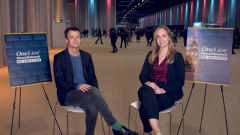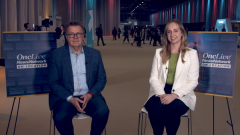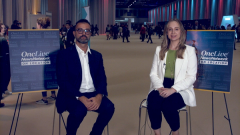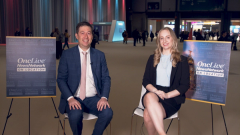
Looking at Novel Treatments in Lung and Genitourinary Cancers From ESMO 2023: Drs Janne and Bastos
OncLive® will be LIVE with OncLive® News Network: On Location at the 2023 ESMO Congress. Each day, we will broadcast a series of interviews with top thought leaders, to learn their thoughts and reactions to data presented across oncology during the conference.
Episodes in this series

OncLive® will be LIVE with OncLive® News Network: On Location at the 2022 ESMO Congress. Each day, we will broadcast a series of interviews with top thought leaders, to learn their thoughts and reactions to data presented across oncology during the conference.
Today-
We are reporting from the 2023 ESMO Congress!
Get ready for highlights of some of the top news presented each day during the meeting—and soon we’ll speak with Dr Pasi Janne to discuss some new data in lung cancer and Dr Bruno Bastos to highlight some of the pivotal studies he is most excited about in genitourinary cancer.
Welcome to OncLive News Network! I’m Caroline Seymour.
Findings from the phase 3 FLAURA2 trial (NCT04035486) showed that the addition of platinum and pemextrexed (Alimta) chemotherapy to osimertinib (Tagrisso) led to a clinically meaningful improvement in progression-free survival (PFS) vs osimertinib alone in patients with advanced, EGFR-mutant non–small cell lung cancer (NSCLC). The study included patients with asymptomatic central nervous system metastases not requiring steroids and stable disease for more than 2 weeks after definitive treatment and steroids.
Moreover, the combination of amivantamab and lazertinib led to a significant improvement in PFS compared with osimertinib alone in patients with newly diagnosed, advanced, EGFR-mutant NSCLC in the phase 3 MARIPOSA trial (NCT04487080). At a median follow-up of 22.0 months, the combination showed a 30% reduction in the risk for disease progression or death vs osimertinib, with a median PFS of 23.7 months vs 16.6 months with osimertinib alone.
In the phase 2 THOR-2 trial (NCT04172675), erdafitinib prolonged relapse-free survival (RFS) vs chemotherapy in patients with high-risk papillary, FGFR-altered non-muscle invasive bladder cancer (NMIBC) following progression on BCG therapy. At a median follow-up of 13.4 months, median relapse-free survival (RFS) was not reached with erdafitinib vs 11.6 months with chemotherapy, with an estimated hazard ratio of 0.28.
Finally, in results from the phase 2 SunRISe-1 trial (NCT04640623), treatment with TAR-200 produced a centrally confirmed complete response rate of 77%. At a median follow-up of 48 weeks in responders, the median duration of response was not reached in patients with BCG-unresponsive, high-risk NMIBC who are ineligible for or refusing radical cystectomy.
Please be sure to check out more of our coverage from the 2023 ESMO Congress at OncLive.com.
That’s all for today. Tomorrow, we’ll sit down with Dr Jacob Sands and Filippo Pietrantonio, who will share their perspectives on breaking research in lung and gastrointestinal cancers.
Thank you for watching OncLive News Network: On Location, I’m Caroline Seymour.










































